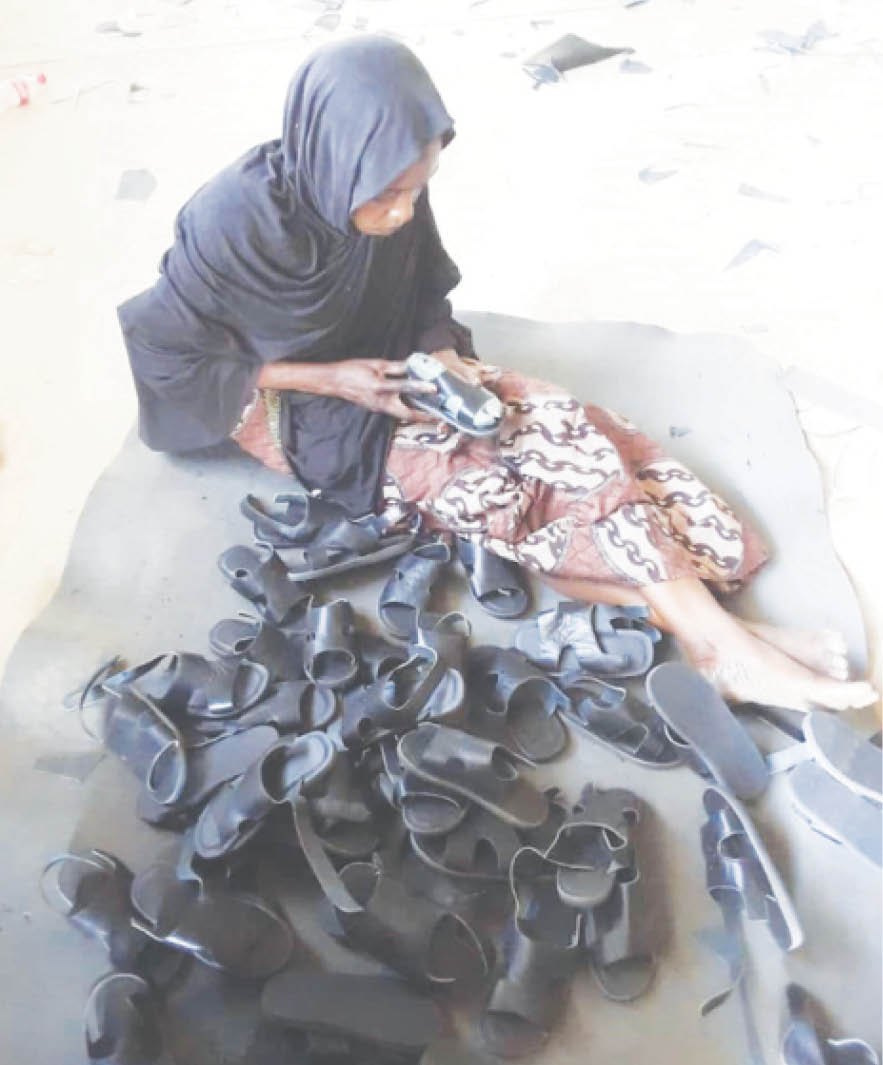It is strange to find a Kanuri woman around Maiduguri, who attains the highest level of western education engaging in a menial job such as shoemaking.
Although the profession is seen as one of the male-dominant practices in Hausa culture, very few Kanuri men venture into it, much not to talk of a woman, owing to the tradition that is popularly identified with prestige.
But the story differs with the case of a 35-year-old Maryam Mohammed Umar, popularly known as M square who, despite her three degrees, resisted all odds to become a cobbler.
No thanks to the surge in dollar currency which invariably led to the increase in the cost of almost every good, the implication though very tough but has been the reason for Maryam’s fortunes in the shoemaking business.
Maryam who is currently studying for her PhD in accountancy hails from Abadam Local Government Area of Borno State, and holds a dream of making Maiduguri the largest maker of local shoes in the country.
Sharing her experience with Kanem Trust, she explained how the rise in the dollar has turned life so difficult for her as someone who depended on foreign business.
“Before now, I used to travel abroad to buy shoes, perfume, other items and sell them. I was making profit, but because of the forex issues, the last time I bought items abroad, I suffered a huge loss to the extent that I couldn’t afford to import shoes, so I had to quit the business.
“I started imagining the consequences of losing my business, knowing fully how I spent most of the profit I generated into buying everything I wanted, to cater for my needs.
“I overstretched my capital because I began surviving on it. I later realised the danger because once the money is finished, I would have nothing to do, so being a Bsc holder in accountancy gave me an opportunity to quickly invest the remaining money to enroll into ANAN, a certified accounting professional course, and subsequently secured my masters admission with the Nigerian Defence Academy, Kaduna.
She said her shoemaking experience began from Kaduna while undergoing her postgraduate degree.
“It started after the only shoe I had worn out and for me to get my shoes from my home town – Maiduguri, it could cost me up to N2000 for transport.
“So few days after I got some money, I devised my option; instead of bringing my pair of shoes from Maiduguri, I preferred buying qualitative shoes in Kaduna.
“While searching, I discovered a shoe seller and after we spoke on the kind of shoes I wanted, he told me that it was out of stock but he would make a new one for me.
“I insisted by asking him: “You mean you make those good shoes?” And he answered, ‘yes.’ So the conversation became so interesting and I changed my earlier request; instead of buying the shoes from him, I asked him to train me on how to do them and I would pay him, which he accepted.
“We started but we couldn’t go far because I was approaching the end of my studies, so I had to concentrate on my coursework. I abandoned the shoe-making training therefore.
“After completing the coursework, I became less engaged, so I called my trainer and explained things to him, and he welcomed me back.
“We started the training and I was the one to sweep the workshop and do some cleaning but I never mind.
“Alhamdulillah after six months of intensive training, I made it.
“Before leaving Kaduna, I bought some of the basic shoe-making items I could use in Maiduguri”, she said.
Maryam said going back to Maiduguri, her dream was almost shattered by cultural stigma from family members in the village who started calling her names because of the shoe-making business she engaged in.
“But I sticked to my passion and today, not only me; I have become a full employer of labour working with 13 young people under me.
“In addition, I voluntarily trained over 200 people free. I want to encourage my fellow young people to join me to make something meaningful from Borno.
“I produced variety of shoes which include sandals, half shoes and cover shoes and I have customers patronising me at a good price.
“It is cheaper for me producing shoes locally than importing abroad; there are no customs charges, no clearance, no missing flights. I buy the raw materials here in Maiduguri and those that I cannot get, I buy from Kano and Kaduna and sell the shoes at any price of my choice,” she said.
Maryam also said she could make between five and 10 shoes a day depending on the type as some take more time to make than others.
On the business prospects, she described it as very lucrative. “I always said that we have a golden opportunity to make sales in volumes, because our state is neighbouring Chad, Niger and Cameroon from where people would also buy from us. With our population, I believe we can feed this state with shoe-making business. In china, there is a whole state that depends largely on shoe-making, so why not us?” she said.
Speaking on her challenges, Maryam mentioned lack of proper modern equipment, power source and good location.
“I request for government and non-governmental organisations to support us with good machines, lapping and cutting machines that are relatively expensive to enable us to expand the business and train more hands especially our Internally Displaced Persons (IDPs).
“Secondly, the shop I am currently renting for the past two years, the owner has asked me to vacate. As I speak to you, I have less than 10 days to leave and finding another shop in Maiduguri is another problem. It could cost around N300, 000 – N350,000 and even if you have the money, getting the shop is also difficult,” she said.
Another request she made was for a power source or generating set that could power the machines to enable smooth operations.

 Join Daily Trust WhatsApp Community For Quick Access To News and Happenings Around You.
Join Daily Trust WhatsApp Community For Quick Access To News and Happenings Around You.


